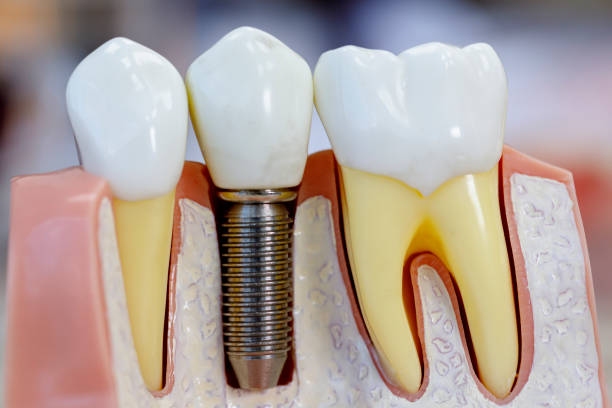Endosteal Dental Implants: The Ultimate Solution to a Confident Smile
Do you often feel self-conscious about your smile because of missing teeth? Do you want a permanent solution that looks and feels like natural teeth? Look no further, as endosteal dental implants may be the ultimate solution for you.
Endosteal vs Subperiosteal Dental Implants
Dental implants serve as a great solution for replacing missing teeth and providing stability for artificial ones. Each type has its own unique characteristics and advantages when it comes to replacing missing teeth, but both are effective options to consider.
Endosteal Implants
Endosteal implants are widely recognized as the most commonly used dental implant option in modern dentistry. During the procedure, a titanium post is carefully inserted into the jawbone. It serves as an artificial tooth root, offering a sturdy base for securing replacement teeth such as crowns, bridges, or dentures. The end result is a natural-looking smile with enhanced functionality and aesthetics.
Subperiosteal Implants
While not as widely used as endosteal implants, subperiosteal implants are a potential solution for individuals who lack sufficient healthy jawbone to support endosteal implants. This alternative option involves placing the implant on top of the jawbone, beneath the gum tissue.
This particular implant is composed of a metal frame that is positioned beneath the gum tissue and above the jawbone. As the gums heal, the frame becomes fixed to the jawbone, providing support for artificial teeth.
What Makes You A Good Candidate for Endosteal Implant?
Endosteal dental implants may be a suitable option for you if:
- You have missing teeth and are looking for a permanent solution
- You have excellent oral health and are free from gum disease or tooth decay.
- You have adequate jawbone density to support the implant
- You either do not smoke or are willing to quit smoking. Smoking can have detrimental effects on the outcome of the procedure.
If you meet these criteria, your dentist may recommend endosteal implants as the best option for replacing your missing teeth.
What are Your Options if You’re not Viable?
If you do not meet the criteria for endosteal implants, don’t worry! There are still other options available to restore your smile and improve your oral health. These include:
- Subperiosteal implants: As mentioned earlier, these implants may be a suitable alternative for those who do not have enough jawbone density to support endosteal implants.
- Bone grafting: In this procedure, bone tissue is taken from another part of the body or a synthetic material is used to strengthen and build up the jawbone. This creates a suitable foundation for endosteal implants.
- Removable dentures: While not as permanent as dental implants, dentures can still provide a functional and aesthetically pleasing solution for missing teeth.
- Dental bridges: These are artificial teeth that are anchored onto existing healthy teeth and can fill the gap left by missing teeth.
It is important to consult with your dentist to determine which option is best for you based on your individual needs and circumstances.
Endosteal Implant Procedure
The procedure for endosteal implants typically involves several steps, including:
- Initial consultation: To assess your eligibility for endosteal implants, your dentist will conduct a comprehensive evaluation of your oral health and carefully review your medical history. This thorough examination is essential in determining if you are a suitable candidate for this type of implant. This is also a great time for you to ask any questions or express any concerns you may have about the procedure.
- Preparation: In some cases, it may be necessary to undergo bone grafting or other procedures before getting an implant. These additional treatments are done to ensure that your jawbone is properly prepared and capable of supporting the implant securely.
- Implant placement: During this step, the endosteal implants are surgically placed into the jawbone. This can typically be done under local anesthesia and is a relatively painless process.
- Healing period: It is important to allow time for the implant(s) to fully integrate with the jawbone. This can take several months, but during this time you may be given a temporary crown or denture to wear.
- Abutment placement: After the implant has successfully integrated with the jawbone, a connector called an abutment is connected to the implant(s). This abutment serves as a link between the implant and the prosthetic tooth or crown that will be placed on top. This will serve as the foundation for your permanent prosthetic tooth/teeth.
- Final crown placement: After the gums have healed, a custom-made prosthetic tooth or teeth (crowns) are placed onto the abutment(s). When you visit your dentist for crowns, they will make sure to match them perfectly with the color and shape of your natural teeth. This ensures that they blend seamlessly and appear as if they are a part of your original smile.
For individuals seeking to regain their smile, endosteal dental implants provide a durable and long-lasting solution. These implants are not only effective but also yield natural-looking results. With a high success rate and minimal risks, it is no wonder that they are the preferred choice for many patients.
If you are dealing with tooth loss or missing teeth, it’s worth discussing endosteal implants with your dentist. These implants could be a potential solution to restore your smile and regain confidence. Don’t let dental issues hinder your ability to smile confidently; take the initiative to explore how endosteal implants can help improve your smile starting today.
Endosteal Dental Implants at Illume Dental are cutting-edge surgically implanted titanium screws in the jawbone to replace missing teeth. These implants provide a secure foundation for natural-looking crowns, bridges, or dentures, restoring function and aesthetics. We offer a durable, long-lasting solution that mimics the look and feel of natural teeth.
Contact us today to schedule your consultation and embark on your journey to a brighter, more confident future. We can’t wait to help you unlock the power of a healthy smile.
